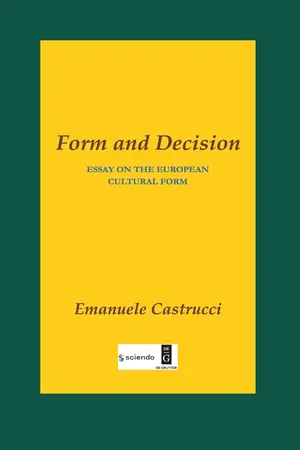
- 238 pages
- English
- PDF
- Available on iOS & Android
About this book
In its philosophical usage the concept of form indicates the entity that makes possible the relationship between orderer and ordered at the origin of all knowledge. In a classic perspective metaphysical form preceded ethical decision: the "forming" intervention consisted, in the discovery or recognition of ontological structures of reality, substantially unchangeable by human beings. If ethical form was a subsection of general ontology, ethical decision was merely its mirror image. In this context, an ex nihilo decision was truly unthinkable. But the modern emergence of the is-ought problem, i.e. the split of norm from the human nature, typical of modernity, undermined the basis of the ancient-classical concept of form. How could the one now be deduced from the other? The starting point understandably lies, historically, in the seventeenth century break of modernity, which highlights the detachment of ethical-political decision from metaphysical form, no longer considered pre-existent. While it is true that onto-theology was inextricably linked, in the great Western-Christian era, to an eschatology, it is in the Baroque period that it fails for the first time. Profane life thus seems separate from transcendent Veritas: no harmonious line of continuity is any longer drawn between the two planes. Decisionism – namely, decision free of form and posited ex nihilo to come to terms with the world's events – is, as is clear, an obligatory outcome, once certain radical epistemological conditions are determined, which the all-encompassing order of the scientific-technological organization of existence by its very nature requires. But decisionism can only reject any discourse on the foundational procedures of its method: on any analysis of the sense of practical systems. Any control over the truth of its contents is precluded. The criterion of ethical validity – which substitutes, according to the non-cognitivistic canons, that of truth – interprets the problem of form in terms of formalism. The studies contained in this book hinge on these points. They intend to suggest that the way to overcome ethical occasionalism, the perennial risk of any decisionistic epistemology, can be sought not only in an overall historical-metaphysical form but by relating ethics with mysticism. In other words: if decision can only intervene within the margins of the utterable, of practical, mundane speech, it is clear then that language – and the language of ethics in particular – is able to embrace only a part of human experience, leaving out – for example, mysticism – «what matters most» (Wittgenstein). The task of the mystical experience, expressed in the second part of Robert Musil's great novel, The Man Without Qualities, with an explicit reference to Wittgenstein's fundamental ethical issues, may be so to provide fresh energy, new life blood to an utterable ethical reflection. An adequate interpretation of all these theoretical topics today could only move on an overtly literary level – a level which however is not to say senseless for problems of ethics and political philosophy. Thomas Mann's Naphta, in The Magic Mountain, who possesses a formidable intellect for dealing with philosophical-political questions, has something to say on this point. Because it is literature (much more than the longwinded debates between meta-theoreticians) that is able to provide valuable pointers on issues of modern ethics in general and of overcoming a vacuous moral occasionalism in particular. The book is divided into three parts. The first part considers the origins of the crisis of the classical concept of form in 17th-century aesthetics and politics, and concepts such as sovereignty, decision and nihilism in the early modern state are directly addressed, in relation to complex cultural phenomena such as Libertinism, Mannerism and the Baroque, in the light of the cumbersome presence of Hobbes. The second part examines the reflections of the crisis of the concepts of form and decision in some literary masterpieces of the early 20th-century Austro-German world, treating as ideal-typical models Musil's, Man Without Qualities, and Mann's ,Magic Mountain. The third part attempts a possible theoretical reconstruction of the concept of ethical form, starting from some ideas of Schopenhauer and Paul Valéry, and ending with a sketch proposing some lines of a conventionalist ethics.
Frequently asked questions
- Essential is ideal for learners and professionals who enjoy exploring a wide range of subjects. Access the Essential Library with 800,000+ trusted titles and best-sellers across business, personal growth, and the humanities. Includes unlimited reading time and Standard Read Aloud voice.
- Complete: Perfect for advanced learners and researchers needing full, unrestricted access. Unlock 1.4M+ books across hundreds of subjects, including academic and specialized titles. The Complete Plan also includes advanced features like Premium Read Aloud and Research Assistant.
Please note we cannot support devices running on iOS 13 and Android 7 or earlier. Learn more about using the app.
Information
Table of contents
- Contents
- Introduction
- Part I. Aesthetics and Politics. Seventeenth-Century European Politics and the End of the Classic Concept of Form
- I. Political Physicalism?
- II. The Indecision of the Libertine. History of Decisionistic Thought and Theory of the Modern State
- III. A Baroque Creature
- Part II Pathways beyond Decision
- IV Ekstatische Sozietat. Robert Musil’s “The Man without Qualities”
- V. Moosbrugger and the Law
- VI. Divine Violence and Disruption of the Theological Form. On the young Walter Benjamin
- VII. Naphta, or a katechon for Europe
- Part III. Reconstructing the Concept of Ethical Form
- VIII. A Critique of Normative Ethics. Some motifs in Schopenhauer’s Philosophy of Law
- IX. Paul Valery’s Plato
- X. Outlines of Conventionalist Ethics
- Epilogue: Form, Decision, Myth. On the Form of a European Civilization
- Notes
- Bibliography
- Index